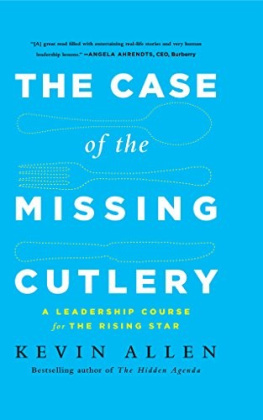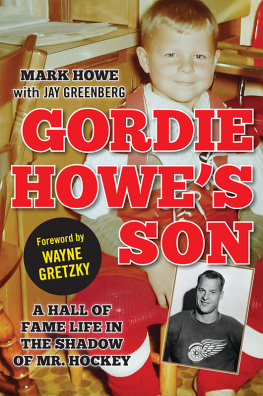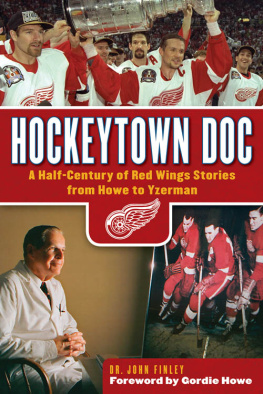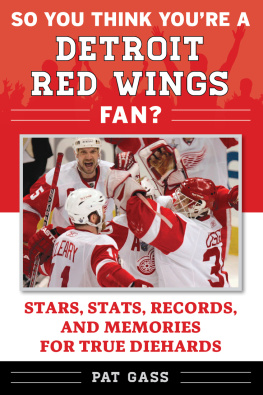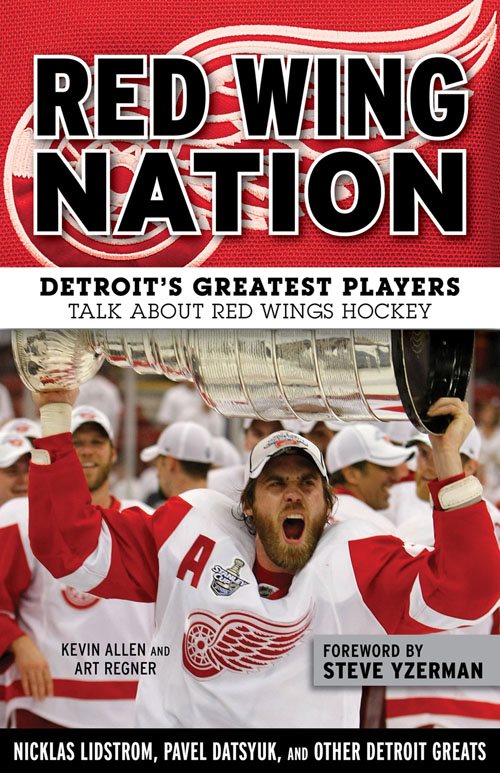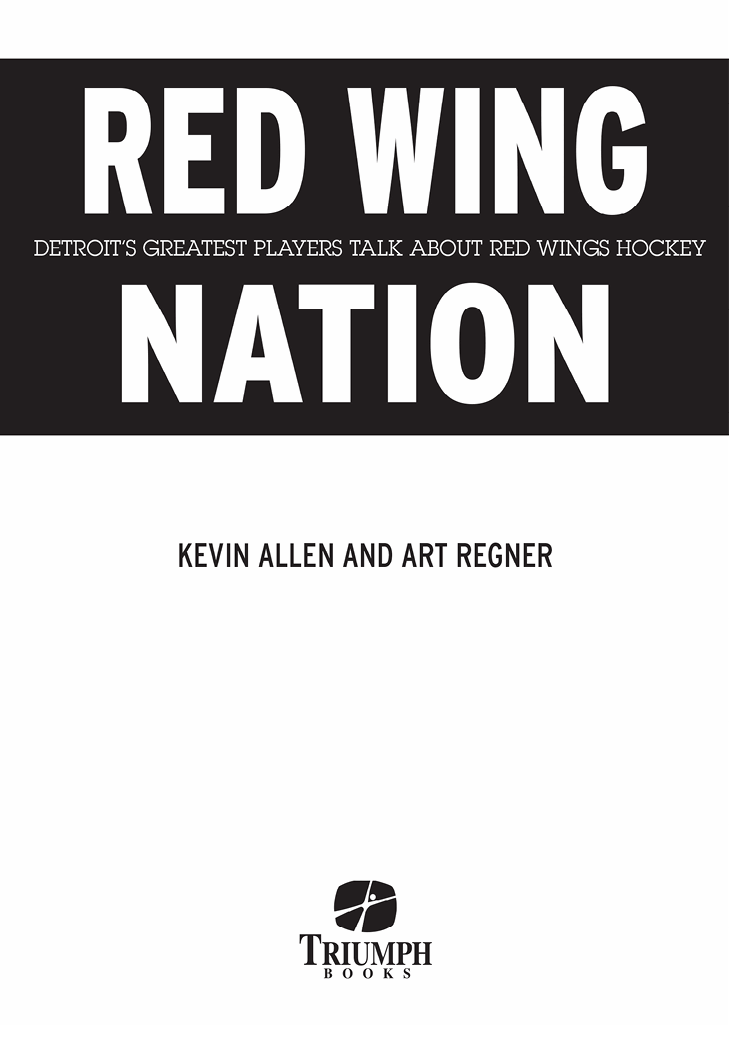
Contents
Ted Lindsay Leo Reise Red Kelly Max McNab Marty Pavelich
Marcel Pronovost Johnny Wilson Metro Prystai Vic Stasiuk Benny Woit Larry Zeidel Glenn Hall Jimmy Skinner
Bruce MacGregor Bill Gadsby Doug Barkley Paul Henderson Peter Mahovlich Bryan Bugsy Watson
Red Berenson Jim Rutherford Danny Grant Dennis Polonich Reed Larson Vaclav Nedomansky Paul Woods
Greg Stefan Jim Devellano Eddie Mio Shawn Burr Harry Neale Jacques Demers Dave Lewis Jim Nill Tim Cheveldae Paul MacLean
Martin Lapointe Nicklas Lidstrom Mark Howe Scotty Bowman Kris Draper Chris Osgood Doug Brown Kevin Hodson Kirk Maltby Tomas Holmstrom Larry Murphy Brendan Shanahan Ken Holland Chris Chelios
Jiri Fischer Jason Williams Pavel Datsyuk Luc Robitaille Henrik Zetterberg
Foreword by Steve Yzerman
If I could write a script about my Red Wings career, could I have written a better one? Sure, I suppose. I probably wouldnt have written in it for me to wait 14 years before I won a Stanley Cup! But things worked out pretty well for me along the way. I came to Detroit when I was 18 years old, and over the years I grew up and changed. Ive learned a lot over the course of my career: about the game, about leadership, about the things that need to be done to make a team sport successful. You learn that by experiencing some of the defeats that we had along the way.
It goes without sayingI was very fortunate to play my entire career in Detroit. Detroit is an Original Six team with a great history of winning. I had quite a few very successful years, and a lot of that was luck and timing. Going back to my very first year, I was lucky to play with some Hall of Fame players.
Right after I was drafted by the Red Wings, I was given a hat, jersey, and Red Wings media guide. I read through all the names of the great Red Wings players who had played for the team and immediately became excited about being a part of the organization. Every player who gets drafted has the initial dream that its going to work out for himthat hes going to win games on his new team and eventually win the Stanley Cup. That was my dreamalong with every other hockey player. You have so much optimism at that time.
When I looked at the Red Wings media guide, it was pretty impressive. Detroit had so many of the great players of the 1950s and 1960s play for them that it really stuck out to me. Players such as Gordie Howe, Alex Delvecchio, Ted Lindsay, and Terry Sawchuk; the list seemed to go on and on. The uniforms hadnt changed much over the years, and it was special to be a part of an organization with such an illustrious tradition.
Talking to Jimmy Devellano at the time or Mr. and Mrs. Ilitch, they had a lot of excitement toward the team. You fed off of the talk of winning; when we won there was excitement and when we lost there was a lot of emotion spent. That kind of feeling carried down to the players because of the passion of the organization.
Of course, the fans were also a key to our success. When we played on the road and saw an arena filled with a large number of Red Wings fans, that sort of enthusiasm that was a great motivator. We shared in the joy when we won and the disappointment when we lost. The dedication and strength of our fans to keep coming back and cheering us on was a significant contribution to the players determination to go through it all again; we all fed off of one another.
Very few guys in the NHL, or any sport, are fortunate enough to go through their careers without some type of major injury. For me, the two bad ones are my knee and my neck; those two really took their toll on me. Everything else, I dont think has really affected what I did on the ice. Some guys get hurt more than others, and I dont know that theres a reason for it.
I look at my injuries as things that really forced me to train harder, and prepare to work harder; so in some ways they were good for me. But on the other side of that, unfortunately, theyve had some permanent effects on what I can and cannot do.
Ive stated this before: when you looked at our team, I didnt feel like I was the centerpiece. After Nick Lidstrom arrived, we had tremendous talent in Detroit. People have debated, Who was the best player on the Red Wings? and despite popular belief, most of our players have been drafted by the organization. We brought in Shanahan, Chelios, and Hasek to help, but our core was homegrown.
I always felt that I was just playing my rolenothing more than Lidstrom, Fedorov, or Shanahan did. We really became a team after 1995, and it was about good players meshing together more than anyone in particular standing out. I never felt like the team was built around me; I was just one of several good players that made up a good team.
Between 1992 and 1996 our team was full of guys who could score, but we were never a solid defensive team. Our way of winning was to score more goals than you could; it was a wide-open style of play. If it was 00 in the third period, we were going to try and force it to score.
But once Scotty Bowman came to our team, a 00 game meant that we were going to sit back and wait for them to make a mistake. We werent really comfortable with that at the beginning.
In 1995 our teams philosophy started to change dramatically because Scotty told us that we were going to become a good defensive hockey club. I played on quite a few different line combinations over the next few seasons. At that point in time, I wanted to play on a good teama team that was a winner. I wasnt about to complain about lines or anything else. For years I had said, Ill do whatever I have to do to win.
If Scotty told me, This is the role youre going to play, whatever the reason was, I was going to accept it. It helped me and I became a better defensive hockey player because of it. Scotty wanted to change our team and told me what I needed to do, saying, This is how Im going to play you and this is what I expect from you. At center we had Igor Larionov, Sergei Fedorov, and Kris Draperplus a lot of offense on the team at that time. I agreed that we had to be a better defensive club, and we all stressed it, from the head coach to the assistant coaches to our entire lineupand as a result we won two Stanley Cups in a row.
With each game that we won in the 1997 Stanley Cup Finals vs. Philadelphia, we got more nervous. In Game 4, we were up 30 in the series, and that was the most nervous I felt going into a game. I kept thinking, The Stanley Cup is right there. We have to win! It was very nerve-racking, so it was a great relief after the game ended and we finally won. I wasnt focused on the 42-year drought in Red Wing Stanley Cups,
I was just glad to be in a position to win that series and I didnt want to mess it up! Thats all I was thinking about at the time and afterward it was more, Oh, Godwhat a relief!
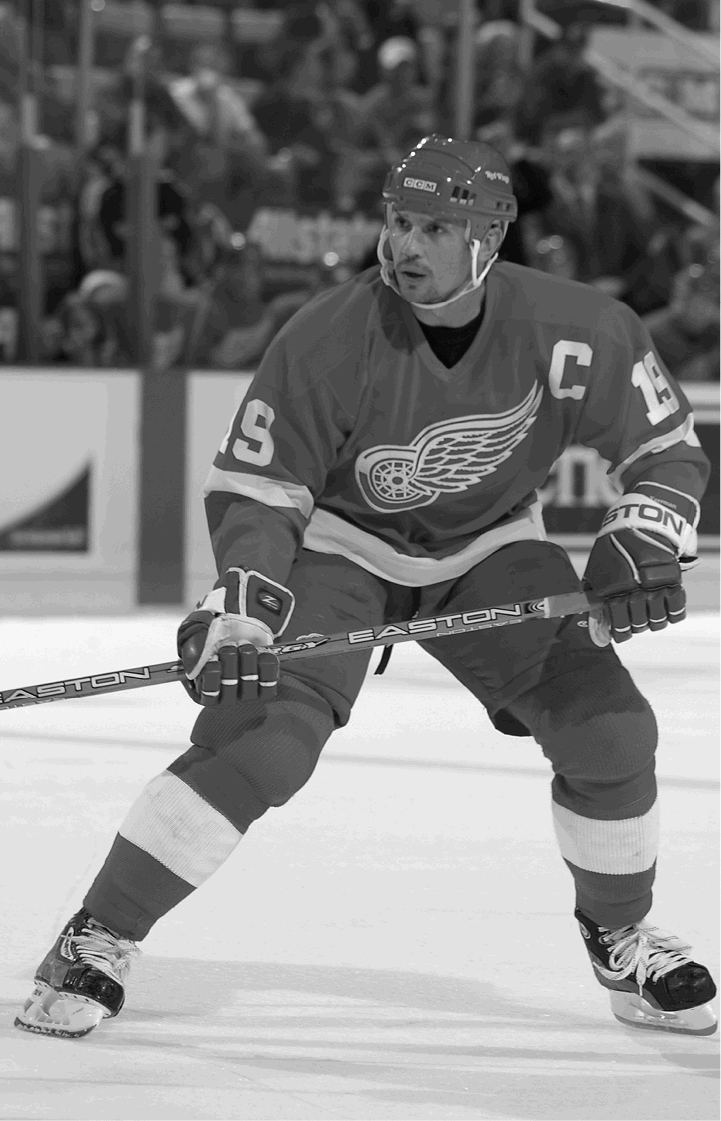
Steve Yzerman was the longest-serving captain of a single team in NHL history.
Ive seen the Stanley Cup raised so many times, so it was the biggest highlight of my entire career to be able to lift that Stanley Cup in front of everyone at Joe Louis Arena! I could have stood there at center ice forever. Holding that Stanley Cup is an irreplaceable moment in my life. I had never thought about who I would hand the Stanley Cup to the first time we won it. I just wanted to win it; I couldnt think about the actual act of what would happen once we did. In 1998 we didnt plan what we would do with the Cup when it was awarded to us either, because we didnt want to jinx it, but Vladdy just happened to be sitting there on the ice with us. Things happen for a reason, and we were able to share it with him at that moment.


